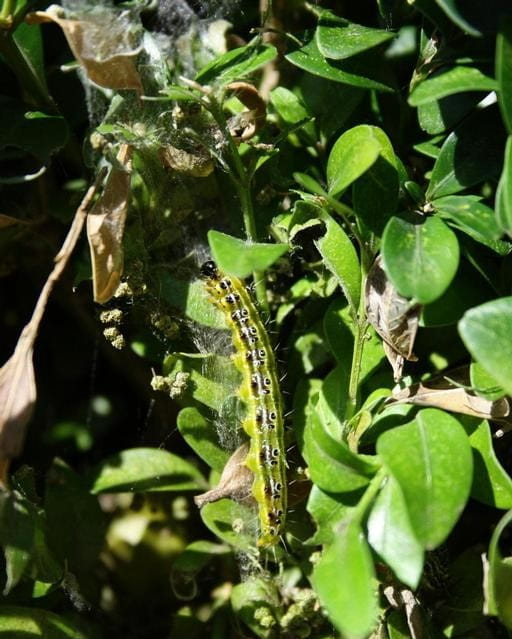The web Browser you are currently using is unsupported, and some features of this site may not work as intended. Please update to a modern browser such as Chrome, Firefox or Edge to experience all features Michigan.gov has to offer.
Learn from the people tackling invasive species issues in upcoming NotMISpecies webinars
August 01, 2023
The NotMISpecies webinar series offers a chance to meet real researchers working to improve Michigan’s environment by better understanding invasive species, climate change and human behavior.
The hourlong programs are free – just register online to watch live and participate in the question-and-answer session, or watch the recorded version at your leisure – with popcorn optional.

Box tree moth caterpillar on box tree.
August
Boaters and anglers, primarily those who travel between waterways without cleaning their equipment, continue to spread aquatic invasive species. Why aren’t people cleaning when we know the risks of spread? Join Carrie Meier from Daniel Hayes’ lab in the MSU Department of Fisheries and Wildlife for “Why, Oh Why Won’t They Clean, Drain and Dry? Understanding Impediments to Boater and Angler Behavior Change” (9 a.m. Thursday, Aug. 10). Meier interviewed a thousand boaters and anglers to find the answers. She will share what was learned about motivations and barriers to equipment cleaning, perceptions of invasive species spread and other interesting results.
October
Ash, elm and chestnut trees once were as common in cities as the streets that bear their names. Our tree canopy today is much less diverse due to insects, disease, invasive species and poor species selection. Lawrence Sobson, Department of Natural Resources urban forester and partnership coordinator, explores the issue in “Where the Sidewalk Ends: Choosing Resilient Trees for Tomorrow’s Urban Environments” (9 a.m. Tuesday, Oct. 3). Sobson will offer examples of ideal tree species, explain how to assess urban sites and provide information to ensure the trees you choose can live for the next hundred years.
November
Box tree moth (Cydalima perspectalis) was first detected in Michigan in fall 2022. This invasive pest, native to East Asia, poses a major threat to the boxwood plant, an ornamental shrub that is a valuable part of the U.S. (and Michigan) nursery and horticultural industry. Join Susie Iott, Michigan Department of Agriculture and Rural Development invasive species program specialist, for “Must You Find Another Shrubbery? Understanding the Impacts of Invasive Box Tree Moth in Michigan” (9 a.m. Tuesday, Nov. 7). She’ll share information on box tree moth identification, its impacts and the state’s response to limit the spread of this invasive pest.
The series will take breaks in September and December, leaving ample time to catch up on episodes you might have missed. Find recordings of all the past NotMISpecies webinars or register for new ones at Michigan.gov/EGLE/Outreach/Not-MI-Species-Webinar-Series.
Michigan’s Invasive Species Program, a collaborative effort of the departments of Natural Resources; Environment, Great Lakes, and Energy; and Agriculture and Rural Development, coordinates and supports invasive species initiatives across the state and provides support through the Michigan Invasive Species Grant Program.